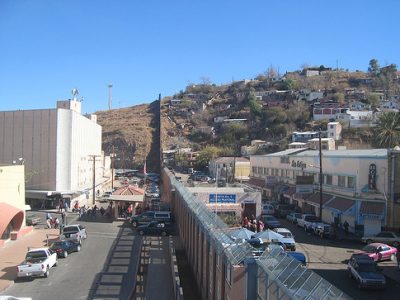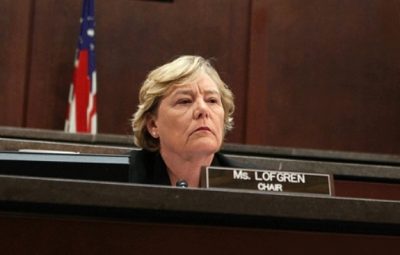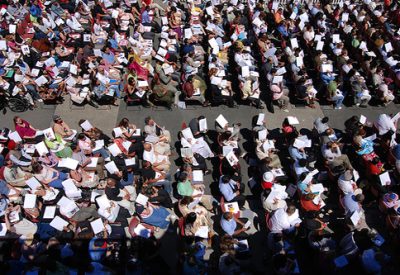Immigration 101
The U.S. immigration system is complex and can be difficult to understand. These resources provide key data points, historical information, and background on hot topics in immigration. Learn the basics about immigration. Immigration in the United States is complex and ever-evolving. Start here to understand the fundamental aspects of immigration policy, its history, and its impact on both individuals and the country at large. Learn commonly used terms about immigration law and how the U.S. immigration system is designed. Explore layered topics like how and whether immigrants can become citizens, as well as what individual protections look like under the law.
How the United States Immigration System Works
- How the Immigration System Works
- June 24, 2024
U.S. immigration law is very complex, and there is much confusion as to how it works. This fact sheet provides basic information…
Read More
Birthright Citizenship in the United States
- Birthright Citizenship
- October 16, 2024
This fact sheet explains birthright citizenship, the Fourteenth Amendment, and its interpretations. Who is…
Read More
Asylum in the United States
- Asylum
- August 27, 2014
Asylum seekers must navigate a difficult and complex process that can involve multiple government…
Read More
DNC Live: Janet Murguia Concludes NDN Immigration Forum
Janet Murguia, CEO of President of National Council of La Raza was the final speaker at NDN's Immigration Reform and the Next Administration forum event at the DNC. Murguia wanted to add another dimension to the conversation by pointing out that as a Latina, she and her fellow Latinos care about a lot of issues--yet immigration is the single issue that crosses across the community and is mobilizing Latinos across the country. Read More

DNC Live: NDN Immigration Forum Resumes with Frank Sharry
Frank Sharry, Executive Director of America's Voice was the third speaker featured at NDN's Immigration Reform and the Next Administration forum event. Sharry began by providing a definition for attrition through enforcement: From the policy point of view, attrition through enforcement assumes we have good laws and bad people and what we have to do is enforce the good laws so that the bad people go away. The idea is to make life so miserable so people will leave. He referred to it as more accurately being a form of "non-violent ethnic cleansing"--making a bad problem worse. Read More

DNC Live: Marco Lopez Continues NDN Immigration Discussion
The next speaker at the NDN's Immigration Reform and the Next Administration forum event at the DNC was Marco Lopez of Arizona, a rising star in American politics. Lopez talked about what Arizona has had to do "creatively" to tackle the growing trend of migration from South to North, acknowledging that Arizona--as one of the fastest growing states--needs workers. Read More

DNC Live: NDN Immigration Forum with Zoe Lofgren
NDN is currently holding a forum on Immigration Reform and the Next Administration at the Democratic National Convention in Denver. NDN President Simon Rosenberg began the conversation acknowledging that the Democrats have "woken up" to the relevance of the immigrant voting population in the upcoming election. NDN Vice-president, Andres Ramirez, introduced Congresswoman and Chairman of the House Committee on Immigration Reform, Zoe Lofgren of California. Read More

What Biden Means for Immigration Reform
This past weekend, presumptive Democratic nominee, Barack Obama, introduced Joseph Biden of Delaware as his vice-presidential running mate. Pro-immigrant and labor groups have lauded Obama's decision to run next to a six-term senator with foreign policy expertise and a firm commitment to comprehensive immigration reform. Frank Sharry of America's voice and a featured panelist at NDN's Immigration Reform and the Next Administration forum event at the DNC said in a released statement "As a member of the Senate Judiciary Committee, he [Biden] has been a strong, consistent and unwavering supporter of common sense immigration reform. Biden understands, as do the majority of Americans, that the immigration system is broken and the current Administration has failed miserably to solve the problem." Read More

Olympic Win Highlights Immigration Challenges
On Tuesday night, Henry Cejudo nabbed an Olympic gold medal for the U.S. and realized the dream that his mother, Nelly Rico, carried with her as she crossed the border from Mexico over twenty years ago. Rico—an undocumented immigrant—encouraged her children to work hard and aim high. Now her son is an American hero and the youngest American wrestler to win a gold in the Olympics. Read More

Voodoo Science Blames Climate Change on Immigrants
According to the anti-immigrant group, the Center for Immigration Studies (CIS), immigrants to the US are now to blame for extreme weather, rising sea levels, changing ecosystems, melting glaciers, and dying polar bears. Forget conservation and sustainability, CIS has released yet another junk science report claiming that the key to reducing global CO2 emissions is lowering immigration levels in the US. CIS accuses environmentalists of frivolously focusing too much on energy conservation and efficiency and having "assiduously avoided the underlying issue of growing energy demand driven by immigration-fueled population growth." Meanwhile, US government scientists say there's insufficient evidence to draw any clear conclusion of immigration's impact on the environment. In fact, it's the DHS' crude enforcement measures that have proved most environmentally destructive. Read More

Immigrants Integrate as Census Predicts Minority Boom
Over five hundred immigrants gathered on July 4, 2007 to take the oath of citizenship. Last week the US Census Bureau projected that minorities will grow to become a majority by the year 2042. A recent New York Times article pointed out that the main reason for the accelerating change is significantly higher birthrates among immigrants. While some fear that demographic shifts threaten American identity, research and experience has shown that today’s immigrants integrate into American society just as generations of immigrants before them. Immigrants are learning English, buying property, intermarrying, becoming U.S. citizens, and otherwise weaving themselves into the fabric of this nation. Read More

The Politics of Contradiction: Immigration Enforcement vs. Economic Integration
Since the mid-1980s, the federal government has tried repeatedly, without success, to stem the flow of undocumented immigrants to the United States with immigration-enforcement initiatives: deploying more agents, fences, flood lights, aircraft, cameras, and sensors along the southwest border with Mexico; increasing the number of worksite raids and arrests conducted throughout the country; expanding detention facilities to accommodate the hundreds of thousands of undocumented immigrants apprehended each year; and creating new bureaucratic procedures to expedite the return of detained immigrants to their home countries. At the same time, the economic integration of North America, the western hemisphere, and the world has accelerated, facilitating the rapid movement of goods, services, capital, information, and people across international borders. Moreover, the U.S. economy demands more workers at both the high-skilled and less-skilled ends of the occupational spectrum than the rapidly aging, native-born population provides. The U.S. government’s enforcement-without-reform approach to undocumented immigration has created an unsustainable contradiction between U.S. immigration policy and the U.S. economy. So far, the economy is winning. Read More

Today’s Immigrant Woman Entrepreneur
Immigrant women entrepreneurs are rapidly making their mark in the U.S. business sector, in every region of the country and across a large range of industries. Today, immigrant women of the post-1960s wave of immigration comprise one of the fastest growing groups of business owners in the United States. This study examines the rise of immigrant women entrepreneurs and profiles them as a group using data from the 2000 Decennial Census and other sources. Read More
Make a contribution
Make a direct impact on the lives of immigrants.

